COVID-19 pandemic in the Czech Republic
![]()
This article describes an ongoing pandemic. The information may therefore change rapidly.
The COVID-19 pandemic in the Czech Republic has been occurring since March 2020 as a regional sub-happening of the global outbreak of the respiratory disease COVID-19. It is caused by the SARS-CoV-2 virus from the coronavirus family, which emerged in late 2019. The COVID-19 pandemic has spread globally from the Chinese metropolis of Wuhan, Hubei Province since December 2019. The World Health Organization (WHO) has classified the outbreak as a pandemic since March 11, 2020.
After the first cases of the disease were confirmed in the Czech Republic at the beginning of March 2020, the Czech government successively introduced numerous spatial distancing measures since 10 March 2020 to slow down the spread. As of 24 April 2020, there were a total of 7188 confirmed infections in the Czech Republic. During the summer, the number of new infections decreased; restrictions were largely relaxed during the summer. From the end of August, infection numbers in the Czech Republic increased more than in most other countries in Europe in percentage terms. A state of emergency has been in place since 5 October 2020. From the beginning of November, the epidemiological situation eased temporarily (see below).
On 9 December 2020, Parliament decided (by 53 votes to 36) to extend the Corona state of emergency up to and including 23 December. The proposal to immediately extend the state of emergency by 30 days until 11 January 2021 did not find a majority. Up to ten people would be allowed to meet indoors; masks were widely required. In January 2021, the Czech Republic had one of the highest infection rates in the world relative to its population. In February 2021, the state of emergency was extended until the end of March. On 26 March 2021, the parliament extended the state of emergency until 11 April. On that day, the seven-day incidence was over 500 (Germany: 119). Since the beginning of the pandemic, over 1.5 million infections and 25,639 COVID deaths have been recorded in the country of 10.7 million people.
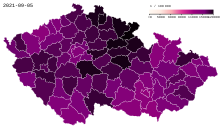
SARS-CoV-2 infections per 100,000 inhabitants in the districts of the Czech Republic
.jpg)
Closed off driver area in a public bus in Brno
History
The first cases were confirmed on 1 March 2020. Three holidaymakers had become infected in northern Italy. On 10 March 2020, the government of Andrej Babiš ordered the closure of schools. On 12 March, a state of emergency was declared. From 14 March, restaurants and business premises had to remain closed. On 16 March, the government ordered the borders with neighbouring countries closed, with exceptions in the area of necessary supplies. From 19 March, the Czech Republic was one of the first European countries to introduce compulsory mouthguards, against the WHO recommendation at the time. Many people sewed masks for themselves and others. "The country turned into one big sewing machine," reported Danko Handrick for Tagesthemen.
On March 22, 2020, a 95-year-old man died; he is considered the first COVID-19 fatality in the Czech Republic.
On 23 March 2020, Česká televize launched the ČT3 television channel to broadcast additional content, especially for senior citizens.
The House of Representatives approved the amendment to the budget in an emergency session on the night of 23-24 March 2020. On March 25, 2020, the closure of the borders to Germany and Austria was also approved for commuters. Health and social professions will have a special permit allowing daily commuting to work.
On 14 April 2020, the government presented a plan for a gradual relaxation of the measures. On 23 April 2020, it decreed numerous relaxations; among other things, it lifted the ban on leaving the country. On 17 May 2020, the state of emergency was lifted. However, numerous restrictions remained in force. Catering establishments and hotels were allowed to reopen from 25 May 2020, and events of up to 300 people are also permitted.
On 26 May 2020, all road and rail border crossings were reopened for cross-border traffic to Germany. However, entry for tourist purposes was not allowed. On the same day, the border to Austria was also opened.
A focus of infection arose in the Darkov mine in the Silesian town of Karviná. On 27 May 2020, 302 cases could be traced back to it. The authorities carried out area-wide tests.
The Czech border was fully reopened to citizens of Germany, Austria and Hungary on 5 June 2020.
On 18 June 2020, the Ministry of Health announced that it would repeal compulsory mouth protection in large parts of the Czech Republic as of 1 July 2020. This regulation did not apply to particularly affected areas, for example the capital Prague. A large part of the restrictions were lifted over the summer.
On 21 August 2020, 506 new covid infections were registered in the Czech Republic. The previous high, 377 new infections, had been reached on 27 March 2020. The neighbouring country Slovakia also recorded a new record. When the Ministry of Health wanted to reintroduce mask obligations as a preventive measure in August 2020, Prime Minister Babiš put the brakes on.
On 31 August 2020, 2304 new infections were registered in the last week, on 7 September 3658 and on 14 September 7649 (doubling time 6.7 days, on average plus 11.1% per day), see Infections section. Whereas at the beginning of the pandemic the Czech Republic was considered a model country for early containment of the spread, in September infections increased alarmingly.
On 21 September 2020, Minister of Health Adam Vojtěch announced his resignation. Epidemiologist Roman Prymula became the Czech Republic's new health minister on 22 September. Prymula announced a renewed declaration of a state of emergency from 5 October 2020 in order to be able to slow down the steep rise in infections with more restrictive measures and to prevent the health system from being overloaded. Over 2900 new daily infections were reported on both 24 and 25 September 2020, as well as on 30 September (2932), 1 October (3493) and 2 October (3793).
The regional and Senate elections on October 2 and 3, as well as the runoff for the Senate a week later, were held as scheduled.
Due to rising infections, schools, theatres, cinemas and sports facilities were closed again from 14 October 2020. Restaurants, bars and pubs also had to close.
On 20 October 2020, 11,984 new infections were registered - the highest figure since the beginning of the pandemic. More than one percent of the population had contracted the virus. With 4064 infected people requiring in-patient treatment, Czech hospitals were operating at 80 percent capacity. Government forecasts say the health system could collapse from November 7 if the restrictions do not take effect.
On October 21, 2020 Health Minister Prymula announced another lockdown starting October 22. All businesses, including restaurants, must close, with the exception of grocery stores, drug stores, and pharmacies. Leaving the home will only be allowed for going to work, necessary shopping, doctor and family visits. Walks in parks and the great outdoors are also allowed. As of October 21, a mask requirement also applied outdoors.
On 22 October 2020, the Czech government closed its border to German nationals wishing to enter the country for shopping or tourist purposes. Business trips and family visits remain permitted. At the beginning of November 2020, the Czech Ambassador to Germany, Tomáš Kafka, clarified that short visits by German nationals for shopping in the Czech Republic would continue to be permitted.
On 23 October 2020, 14,151 new infections were reported within 24 hours. Babiš announced that he had asked Health Minister Prymula to resign after he himself failed to comply with the measures. Prymula had been photographed leaving a restaurant without a nose mask. He was succeeded as Health Minister on 29 October by Jan Blatný.
On 5 November 2020, 8200 infected persons were in Czech hospitals. On 9 November 2020, the Czech Republic reported 3608 new infections in one day, almost 3000 fewer than a week earlier.
On 16 November 2020, the risk assessment system Protiepidemický systém (PES - "anti-epidemic system") was introduced. The current epidemiological situation is presented in five levels from green to purple. For each level, restrictions on public life are foreseen to varying degrees. On 23 November, the highest risk level purple was downgraded to red nationwide and, among other things, a partial opening of schools was announced from 25 November.
As of December 27, 2020, the Czech Republic is once again in the highest level of lockdown. Restrictions on curfew and a 9 p.m. to 5 a.m. curfew are in effect across the country. December 27 also marked the start of Covid 19 vaccination in the country.
In February 2021, it was estimated that at least two million people in the Czech Republic had already been infected with the SARS-CoV-2 virus.
On 7 April 2021, Prime Minister Babiš dismissed Health Minister Blatný and Petr Arenberger succeeded him as the fourth minister since the beginning of the pandemic. The reason for this is said to have been Blatný's rejection of a national emergency approval for the Russian vaccine Sputnik V, which had been advocated above all by President Miloš Zeman.
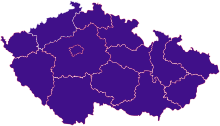
Epidemiological situation by region according to the PES risk assessment system

Easter lamb with mouth guard
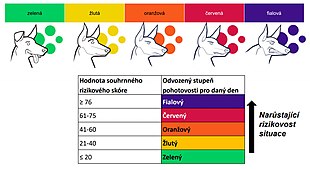
Five-stage risk assessment system PES
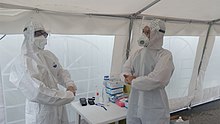
Covid test tent in Budweis
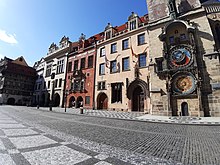
The deserted square in front of the Prague City Hall Clock in March 2020
Cyberattacks and disinformation
The Czech government has warned against attempts to use the coronavirus crisis to launch cyberattacks against hospitals. Former Czech Health Minister Adam Vojtěch confirmed that there had already been cyberattacks on healthcare facilities. According to some media reports, Russia carried out the attacks against Czech infrastructure, but the Russian embassy in Prague denies this. Relations between the Czech Republic and Russia were particularly strained at the time of the alleged attacks after the capital's authorities named a small square in Prague, where the Russian embassy is located, after murdered dissident Boris Yefimovich Nemtsov and removed the Prague monument to Soviet Marshal Ivan Stepanovich Konev (who is considered to have liberated Prague in May 1945) from its previous prominent location. These domestic political decisions, initiated by the Prague city administration but not coordinated with the Czech government, were seen by Russia as an affront.
False information about the COVID-19 pandemic is circulating in some Czech media, such as claims that the pandemic was developed by the United States in order to sell an expensive vaccination and thus avert America's alleged imminent financial collapse. Such false reports are based on disinformation from Russian state media and can be traced to publications in Russian.
Search within the encyclopedia